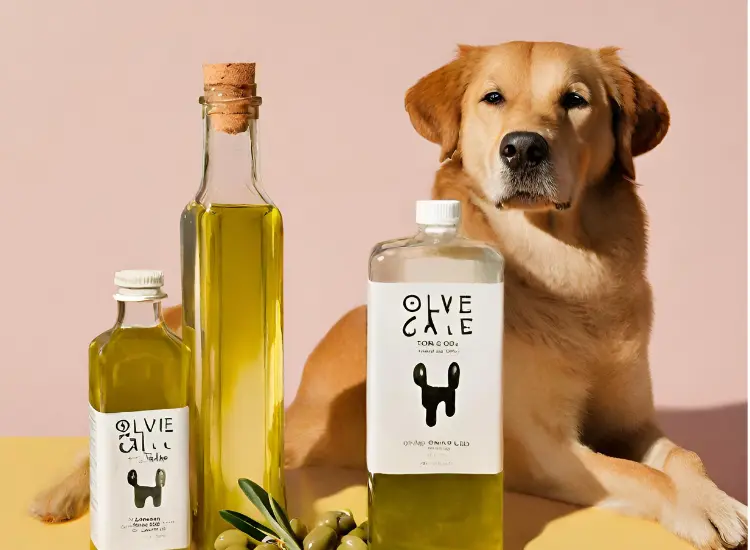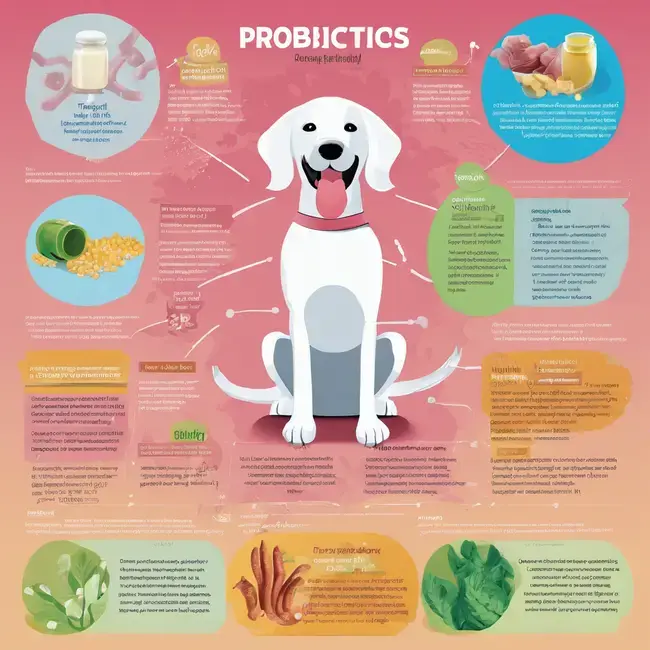Is Olive Oil Good for Dogs? Discover 8 Benefits and Risks

- Can dogs eat olive oil?
- Is olive oil good for dogs?
- How much olive oil should you give to your dog?
- Nutritional value of olive oil for dogs
- Key benefits of olive oil for dogs
- Risks associated with olive oil for dogs
- Is olive oil good for dogs skin?
- Is olive oil good for dogs itchy skin?
- Is olive oil good for dogs constipation?
- Is olive oil good for dogs with pancreatitis?
- Is olive oil good for dogs ears?
- Is olive oil good for dogs with kidney disease?
- Is olive oil good for dogs paws?
- Precautions when feeding olive oil to dogs
- Other foods safe for dogs to eat
- Conclusion: So, can dogs have olive oil?
- Frequently Asked Questions (FAQs)
- References
This post may contain affiliate links, meaning I may earn a commission if you make a purchase, at no extra cost to you. I only recommend products I trust. Thank you for your support.
When it comes to our dogs, we always want to ensure they have the best possible care and this also includes their diet and nutrition.
While some foods are off-limits to dogs, others can be beneficial for their health. One such food is olive oil. But can dogs eat olive oil and is olive oil good for dogs?
In this article, we will explore the health benefits, precautions, and risks of olive oil for dogs, as well as answer some commonly asked questions regarding its use.
Can dogs eat olive oil?
Yes, dogs can eat olive oil. Olive oil is safe for dogs to consume in moderation and can provide various health benefits for dogs.
However, it’s important to note that olive oil should be used as a supplement to their regular diet and not as a replacement for balanced dog food.
Is olive oil good for dogs?
Yes, olive oil is good for dogs in several ways. It contains vitamin E, polyphenols, and monounsaturated fats, which are considered healthy fats. These fats can help improve their skin, coat, and overall health.
However, excessive consumption can lead to weight gain and digestive issues in dogs.
How much olive oil should you give to your dog?
When it comes to giving your dog olive oil, moderation is key. The appropriate amount will depend on your dog’s size, weight, and individual needs.
As a general guideline, the recommended dosage is:
- Small dogs below 15 pounds: ¼ to ½ teaspoon of olive oil per day.
- Medium dogs between 15 and 35 pounds: ½ to 1 teaspoon of olive oil per day.
- Large dogs above 35 pounds: 1 to 2 teaspoons of olive oil per day.
It’s important not to overdo it, as excessive consumption of olive oil can lead to digestive upset and weight gain.
Nutritional value of olive oil for dogs
When considering the nutritional value of olive oil for dogs, it’s important to note that olive oil is a natural oil rich in nutrients with many health benefits for dogs.
Here are some important nutrients found in olive oil for dogs:
1. Monounsaturated fats
These healthy fats in olive oil for dogs can help improve cardiovascular health and reduce inflammation.
2. Polyphenols
Olive oil for dogs contains antioxidants called polyphenols, which have anti-inflammatory and anti-cancer properties.
3. Vitamin E
This vitamin is essential for your dog’s immune system and can help protect their cells from damage.
4. Omega-3 fatty acids
These fatty acids support brain function, reduce inflammation, and promote healthy skin and coat.
5. Omega-6 fatty acids
While dogs need some omega-6 fatty acids, an imbalance can contribute to inflammation. Olive oil can help maintain a healthy balance.
6. Antioxidants
Olive oil contains antioxidants such as vitamin E and polyphenols, which can help neutralize free radicals and promote overall health.
7. Calories
Olive oil is calorie-dense, making it a good way to add extra energy to your dog’s diet, especially for active or working dogs or those needing to gain weight.
8. Phenolic Compounds
Olive oil contains phenolic compounds that have been linked to various health benefits, including anti-inflammatory and anti-cancer properties.

Key benefits of olive oil for dogs
Olive oil can offer various health benefits to dogs when used appropriately.
Here are the key benefits of olive oil for dogs:
1. Healthy coat and skin
Vitamin E, omega-3 fatty acids, and polyphenols found in olive oil can improve the condition of your dog’s coat and skin by reducing dryness, itching, and flakiness, leaving their fur soft and shiny.
2. Supports joint health
The anti-inflammatory properties of olive oil for dogs can benefit dogs with arthritis or joint pain. It may help reduce inflammation and discomfort, improving their mobility.
3. Support for digestive health
The high content of monounsaturated fats, particularly oleic acid, found in olive oil supports healthy digestion and aids in nutrient absorption.
Additionally, olive oil’s lubricating properties can provide relief for dogs experiencing constipation, contributing to smoother bowel movements.
4. Weight management
The monounsaturated fats in olive oil can aid in breaking down fat cells, potentially helping dogs lose weight or reduce the risk of obesity.
5. Supports heart health
Olive oil is rich in antioxidants, which can help protect your dog’s heart from free radicals and oxidative stress. It may also help regulate cholesterol levels.
6. Boosts the immune system
The vitamins and antioxidants in olive oil can support your dog’s immune system, keeping them healthy and less prone to infections.
7. Supports brain function
The omega-3 fatty acids in olive oil are beneficial for brain health. They can support cognitive function and may even help prevent cognitive decline in older dogs.
8. Antibacterial and antifungal properties
Olive oil has natural antibacterial and antifungal properties, which can help prevent and treat certain skin infections in dogs.
Risks associated with olive oil for dogs
While olive oil can provide numerous health benefits for dogs, it’s essential to be aware of the potential risks associated with olive oil for dogs.
Here are the potential risks of olive oil for dogs:
1. Weight gain
Excessive consumption of olive oil can lead to weight gain in dogs, so it’s important to use it in moderation.
2. Digestive upset
Some dogs may experience diarrhea or other digestive issues if given too much olive oil. Start with small amounts and monitor their response.
3. High caloric content
Olive oil is high in calories, so it’s crucial to factor it into your dog’s overall calorie intake to avoid overfeeding.
4. Pancreatitis risk
Dogs with pancreatitis or other pancreas related conditions should avoid olive oil, as it can exacerbate these conditions.
5. Allergies
Some dogs may be allergic to olive oil. If you notice any signs of an allergic reaction, such as itching, swelling, or difficulty breathing, discontinue use and consult your veterinarian.
6. Gastrointestinal disorders
Dogs with certain gastrointestinal disorders, such as inflammatory bowel disease, may not tolerate olive oil well.

Is olive oil good for dogs skin?
Yes, olive oil can be beneficial for dogs skin. It has moisturizing properties that can help alleviate dryness, itchiness, and flakiness.
Additionally, olive oil’s antibacterial and antifungal properties can help prevent and treat certain skin infections in dogs.
Is olive oil good for dogs itchy skin?
Yes, olive oil can provide relief for dogs with itchy skin. The moisturizing properties of olive oil can help soothe dry and irritated skin, reducing itching and discomfort.
You can apply a small amount of olive oil topically to your dog’s skin or add it to their food to promote healthy skin from the inside out.
Is olive oil good for dogs constipation?
Yes, olive oil can help relieve constipation in dogs. Its lubricating properties can soften the stool and promote regular bowel movements.
If your dog is experiencing constipation, you can add a small amount of olive oil to their food or give it to them directly. Start with a teaspoon and gradually increase if needed.
Is olive oil good for dogs with pancreatitis?
No, olive oil is not recommended for dogs with pancreatitis or other pancreas related conditions. Olive oil is high in fat and can trigger an episode or worsen the condition.
If your dog has a history of pancreatitis or is prone to the condition, it’s best to avoid giving them olive oil.
Is olive oil good for dogs ears?
Yes, olive oil can be used to clean your dog’s ears, but it’s important to do so with caution.
It can help soften and remove earwax buildup, but it should not be used if your dog has an active ear infection or a perforated eardrum.
Is olive oil good for dogs with kidney disease?
While olive oil is generally considered safe and may offer some benefits such as providing healthy fats and antioxidants, it is also high in calories and can potentially exacerbate issues related to kidney disease, such as weight gain or elevated phosphorus levels.
In cases of kidney disease in dogs, the primary focus should be on a specialized diet tailored to manage the condition, which typically involves controlling phosphorus intake, maintaining proper hydration, and monitoring protein levels.
Olive oil should not be used as a substitute for these dietary recommendations but may be used sparingly and under supervision to provide some nutritional benefits.
Is olive oil good for dogs paws?
Yes, olive oil can be beneficial for your dogs paws. It can help moisturize dry and cracked paw pads, keeping them soft and supple.
Additionally, olive oil’s antibacterial properties can help prevent infections and promote healing. You can apply a small amount of olive oil topically to your dog’s paw pads, gently massaging it in.
Precautions when feeding olive oil to dogs
While olive oil can be beneficial for dogs, there are a few precautions to keep in mind:
1. Moderation
As mentioned earlier, it’s essential to give olive oil to dogs in moderation. Excessive consumption can lead to weight gain, digestive issues, or other adverse effects. Always follow the recommended dosage guidelines based on your dog’s size and weight.
2. Caloric consideration
Factor in the additional calories from the olive oil when planning your dog’s overall diet to prevent overfeeding.
3. Monitoring
Although rare, some dogs may be allergic or sensitive to olive oil. Monitor your dog closely after introducing olive oil into their diet and watch for any signs of allergic reactions, such as itching, swelling, or gastrointestinal upset.
4. Quality and storage
Always choose high-quality extra virgin olive oil for your dog, as it retains more nutrients and undergoes minimal processing. Store the olive oil in a cool, dark place to preserve its freshness and prevent oxidation.
Other foods safe for dogs to eat
While olive oil can provide health benefits for dogs, there are other foods that are also safe and beneficial for them to consume.
Here are some examples:
1. Broccoli
Broccoli is a nutritious vegetable that can provide dogs with vitamins, fiber, and antioxidants. It should be cooked before feeding to make it easier for dogs to digest.
2. Bananas
Bananas are a great source of potassium, vitamin C, and fiber. They make for a healthy and tasty treat for dogs.
3. Cantaloupe
Cantaloupe is a refreshing fruit that can provide dogs with hydration, vitamins A and C, and antioxidants. It should be given in moderation due to its sugar content.
4. Shrimp
Shrimp can be a good source of protein for dogs. However, it should be cooked and served plain without any seasoning or added ingredients.
5. Pineapple
Pineapple is a tropical fruit that can provide dogs with vitamins, minerals, and digestive enzymes. It should be given in moderation due to its sugar content.
6. Cauliflower
Cauliflower is a low-calorie vegetable that can be given to dogs as a healthy snack. It should be cooked and served plain without any seasoning.
7. Celery
Celery is a crunchy and hydrating vegetable that can be beneficial for dogs. It can help freshen their breath and provide them with vitamins and fiber.
8. Peas
Peas are a good source of fiber, vitamins, and minerals for dogs. They can be served cooked or frozen as a tasty treat.
9. Rice
Rice is a easily digestible grain that can be added to a dog’s diet as a source of carbohydrates. It should be cooked plain without any added seasoning or ingredients.
10. Raw chicken
Raw chicken should be handled with caution due to the risk of bacterial contamination. If feeding raw chicken to your dog, it’s important to choose high-quality chicken and follow proper food safety guidelines.
Conclusion: So, can dogs have olive oil?
Yes, dogs can have olive oil. Olive oil can offer various health benefits for dogs, including improved skin and coat health, digestive aid, and anti-inflammatory properties.
However, it’s essential to use it in moderation and choose high-quality extra virgin olive oil.
Always consult your veterinarian before making any dietary changes or adding olive oil to your dog’s diet. With the right approach, olive oil can be a valuable addition to your dog’s overall well-being.
After reading this article, I trust that you can now confidently answer the question “Is olive oil good for dogs?” and make informed decisions when incorporating it into your dog’s diet.
You may also be interested in these articles:
- Top 10 probiotics for dogs
- Is salmon good for dogs?
- Is tuna good for dogs?
- 21 day fatty liver meal plan
- Why you should have a therapy dog
- 7-day 1600 high protein meal plan for weight loss
- 1400 calorie meal plan high protein
- Caretaker vs caregiver roles
Frequently Asked Questions (FAQs)
Is olive oil bad for dogs?
No, olive oil is generally good and safe for dogs when used in moderation. However, excessive consumption can lead to weight gain or digestive issues.
How much olive oil for dogs per day?
Small dogs can generally have ¼ to ½ tsp per day, medium dogs can have ½ to 1 tsp per day, and large dogs can have 1 to 2 tsp per day.
Coconut vs olive oil for dogs
The choice between coconut oil and olive oil depends on your dog’s specific needs.
Coconut oil is known for its antimicrobial properties and can be beneficial for skin conditions and digestive issues.
On the other hand, olive oil is rich in omega-3 fatty acids, which support coat and skin health, joint health, and heart health.
What is the best olive oil for dogs?
The best olive oil for dogs is fresh high-quality, extra virgin olive oil. Extra virgin olive oil is less processed and retains more of its beneficial nutrients.
Look for brands that are transparent about their sourcing and production methods to ensure you are getting a high-quality product.
How long does it take for olive oil to relieve constipation in dogs?
In mild cases, olive oil may provide relief within a few hours. However, in more severe cases, it may take a couple of days or longer to see noticeable improvement.
Please note that the time it takes for olive oil to relieve constipation in dogs can vary depending on the severity of the condition and the individual dog.




